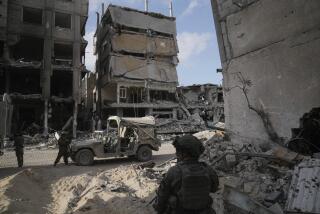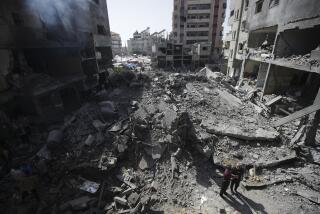Afghanistan faults U.S., Taliban for deadly airstrike
KABUL, Afghanistan — The Taliban and U.S. military were both at fault in a NATO airstrike in eastern Afghanistan this month that killed 17 civilians, including 12 children, according to an Afghan government investigation. The inquiry raised the number of civilian deaths from an earlier total of 11.
The North Atlantic Treaty Organization has completed an investigation of the same incident in Kunar province, but its report is still under review, a coalition spokesman said.
The deaths of civilians in the Afghanistan war have been a highly sensitive political issue.
According to the Afghan investigation of the April 6 incident released Saturday, security forces were on a mission to arrest two Taliban commanders, Qari Mohammad Hanif and Ali Khan, when they were ambushed by gunmen with light and heavy weapons, resulting in the death of an American advisor.
U.S. forces then called in NATO airplanes, investigators said, both to remove the body and to strike homes believed to house attackers. Afghan investigators said the houses were made of wood and mud and quickly collapsed, resulting in the large number of casualties. In addition to those killed, 12 people were injured. Reports at the time said the Taliban fighters were also killed.
“As the reports confirm that armed Taliban were there in the area, we strongly condemn the use of civilians and their homes as shields by the Taliban,” President Hamid Karzai said in a statement. But, he added, airstrikes on residential areas are not acceptable “under any name and for any purpose whatsoever.”
Karzai added that the airstrike in a crowded residential area by the International Security Assistance Force violated human rights and breached an Afghan executive order banning the use of such weapons in populated neighborhoods.
Karzai’s relations with partners of the international military coalition, particularly the United States, have been strained as foreign combat troops prepare to leave the country by late 2014. Political analysts say Karzai is seeking to distance himself in hopes of strengthening his credentials as a leader who has defended the nation’s interests.
The investigation was done by a team from Kabul in consultation with 75 tribal and religious leaders from the province, which is often used by militants from northwestern Pakistan.
The U.S.-led coalition said it launched airstrikes in Kunar province that day but has not confirmed civilian casualties. It also said the strikes did not take place in an area with buildings.
According to a statement from the Afghan president’s office, Karzai told President Obama on Tuesday that more such incidents could jeopardize a bilateral security pact aimed at allowing a limited U.S. military presence in Afghanistan after 2014. The two sides have been trying to hammer out an agreement, but have failed to see eye to eye on whether U.S. soldiers would be immune from Afghan legal jurisdiction, a standard provision in all so-called status of forces agreements with foreign powers.
Atiqullah Amarkhail, a Kabul-based military analyst, said the U.S. and Afghan forces should have assumed that they would face a hostile reaction from neighbors when attempting to arrest the two Taliban commanders and employed more backup, obviating the need for airstrikes.
Although public protests of airstrikes resulting in civilian casualties have waned somewhat, the issue remains a sensitive one, Amarkhail said.
“People’s tears have dried because it’s happened so often,” he said. “But the anger hasn’t gone away.”
Special correspondent Hashmat Baktash in Kabul contributed to this report.
More to Read
Sign up for Essential California
The most important California stories and recommendations in your inbox every morning.
You may occasionally receive promotional content from the Los Angeles Times.










